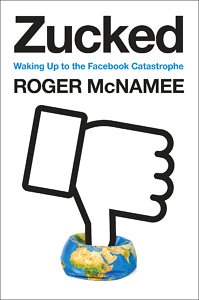The Platforms of Contempt
Tech insider Roger McNamee explores all the ways social media manipulates us
Ten days before the U.S. presidential election of 2016, Roger McNamee, Mark Zuckerberg’s former mentor, alerted him to design flaws that made Facebook a danger to democracy and public health. McNamee expected Zuckerberg and Sheryl Sandberg—Facebook’s Chief Operating Officer, whom McNamee himself had recommended for the job—to heed his counsel. But, as McNamee notes in Zucked: Waking up to the Facebook Catastrophe, but both Zuckerberg and Sandberg dismissed him, choosing instead to communicate through a senior executive that “Facebook technically was a platform, not a media company, which meant it was not responsible for the actions of third parties.”

A successful venture capitalist and technology investor, McNamee describes the evolution of the tech industry and public adaptations to it. Whether or not you’ve kept track of evidence that Russian operatives exploited Facebook and Twitter to manipulate the 2016 election, this short history of the tech industry and how it has evolved is worth the read for McNamee’s clear distillation of key events, game-changing innovations, and expert analyses of the platforms’ benefits, risks, and clear dangers. From the early days of IBM and Microsoft to the open-source innovation of the internet and the accelerated processing speeds and artificial intelligence that enabled the rise of social media, McNamee describes the way industry idealism obscured the dangers of a connected world—a world with no controls against false identity, fake news, and anonymous manipulation.
In 2016, McNamee observed polarizing messages from what seemed like legitimate Facebook groups as they spread political propaganda across the internet, fueling the fires that stoked Brexit, spreading hate speech, and elevating a presidential candidate who embraced racism and xenophobia. “Filter bubbles exist wherever people are surrounded by people who share the same beliefs and where there is a way to keep out ideas that are inconsistent with those beliefs,”McNamee writes. “They prey on trust and amplify it.”
McNamee admits that such filter bubbles can exist anywhere. They are as much a product of social stratification and racial segregation as of social media. But, he notes, such bubbles actually benefit social-media platforms “because they improve metrics that matter: time on site, engagement, sharing.” This reality gives tech companies no incentive to prevent the dissemination of propaganda. In 2018, facing a Congressional investigation, Zuckerberg admitted that 126 million users of Facebook and 20 million users of Instagram had been subject to Russian interference.
 As Facebook developed its platform to promote user engagement under the seemingly idealistic notion of “connecting” the world, it was laying the groundwork for selling its most lucrative product: its users. For Facebook, “sharing” is less about promoting social bonds than about the amount of our attention the platform can monopolize. That’s because Facebook is in the business of selling ads, and those ads are tailored to us based on data we willingly share on the platform. Users are more likely to like and share posts that make them outraged or afraid, so Facebook developed algorithms that promote the sharing of negative emotions over neutral or positive ones. “Facebook knows so much about each user that they can often tune News Feed to promote emotional responses,” McNamee writes.
As Facebook developed its platform to promote user engagement under the seemingly idealistic notion of “connecting” the world, it was laying the groundwork for selling its most lucrative product: its users. For Facebook, “sharing” is less about promoting social bonds than about the amount of our attention the platform can monopolize. That’s because Facebook is in the business of selling ads, and those ads are tailored to us based on data we willingly share on the platform. Users are more likely to like and share posts that make them outraged or afraid, so Facebook developed algorithms that promote the sharing of negative emotions over neutral or positive ones. “Facebook knows so much about each user that they can often tune News Feed to promote emotional responses,” McNamee writes.
McNamee consults a wide range of experts in his investigation of the ways social media erodes human agency and democracy by exploiting addictive behavior and manipulating our emotions. But even with the range of emoticons introduced to expand the reach of the “Like” button, he notes, the human feeling most often induced by personalized newsfeeds and filter bubbles is contempt. And contempt erodes civil discourse and tears at the social fabric of a republic. Zucked is full of statistics and research on the negative impact social media has had on public health.
Despite it all, McNamee remains an optimist, offering a vision for how Facebook can become the socially responsible company it believes itself to be, and suggesting concrete ways for users to take back their time and attention. It’s not too late, he believes, for social media to provide an authentic social connection and to promote a truly productive exchange of ideas in service to democracy and the common good.

Beth Waltemath graduated with a degree in English from the University of Virginia and worked at both Random House and Hearst magazines before leaving publishing to attend Union Theological Seminary in New York City. A Nashville native, she now lives in Decatur, Georgia.


